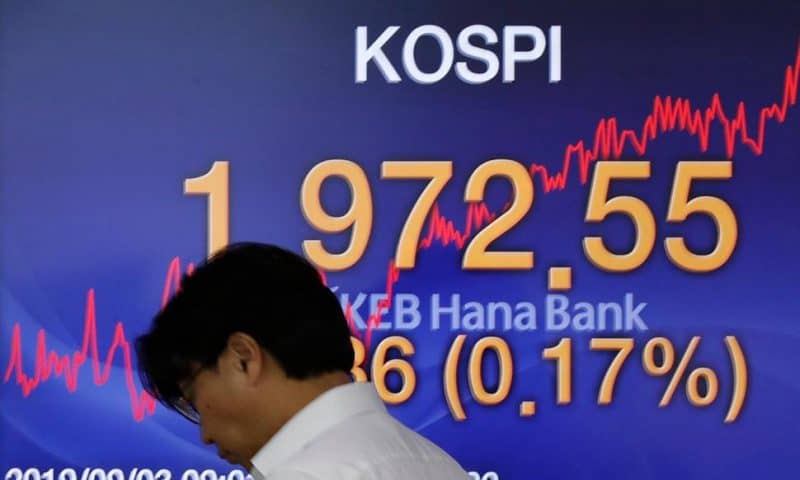Asian stock markets lower amid revived jitters over U.S.-Chinese trade tension.
BEIJING — Asian stock markets were mostly lower Tuesday after investor jitters over U.S.-Chinese trade tension were revived by a report negotiators cannot agree on a schedule for talks this month.
Tokyo’s market benchmark advanced while Shanghai, Hong Kong and South Korea declined.
Markets reacted less strongly to last weekend’s U.S. and Chinese tariff hikes in a fight over trade and technology. But investors who are looking for signs of progress were dismayed by a Bloomberg News report trade envoys were struggling to agree on a schedule.
“If they’re struggling to decide simple itinerary, expectations for anything tangible to arise from the trade talks are looking incredibly dim,” said Stephen Innes of AxiTrader in a report.
The Shanghai Composite Index was off 1 point at 2,922.54 and Tokyo’s Nikkei 225 advanced 0.2% to 20,656.93. Hong Kong’s Hang Seng lost 0.1% to 25,601.70.
Seoul’s Kospi shed 0.2% to 1,964.24 and Sydney’s S&P-ASX 200 was 3 points lower at 6,576.20. India’s Sensex fell 1% to 36,916.76.
New Zealand and Singapore advanced while Taiwan and Indonesia retreated.
U.S. markets were closed Monday for a holiday.
In Europe, London’s FTSE 100 rose 1.1% and France’s CAC 40 added 0.2%. Germany’s DAX was 0.1% higher.
President Donald Trump has sounded optimistic about negotiations over China’s trade surplus and complaints Beijing steals or pressures companies to hand over technology is unlikely to be quickly resolved.
There is no indication either side is willing to break a deadlock in talks by offering concessions.
On Sunday, the United States started charging 15% tax on about $112 billion of Chinese imports. China responded by charging taxes of 10% and 5% on a list of American goods.
AUSTRALIAN RATES: The Reserve Bank of Australia held its benchmark interest rate steady at 1% at its September board meeting. That followed 0.25% cuts in June and July. A bank statement cited risks to global growth from the U.S.-Chinese tariff war and uncertainty over Australian consumer spending.
ENERGY: Benchmark U.S. crude lost 22 cents to $54.88 per barrel in electronic trading on the New York Mercantile Exchange. The contract fell $1.61 on Monday to close at $55.10. Brent crude, used to price international oils, added 1 cent to $58.67 per barrel in London. It sank 69 cents the previous session to $58.66.
CURRENCY: The dollar advanced to 106.29 yen from Monday’s 106.22 yen. The euro declined to $1.0936 from $1.0969.

